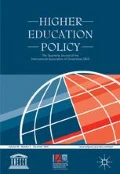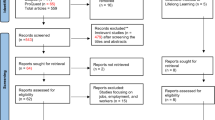This article investigates how policy learning could be used as an analytical tool for studying the development process of Bologna study cycles (Bachelor’s, Master’s and Doctorate’s or Ph.D.) in the Ukrainian higher education context. The development of the Bologna study cycles in Ukraine is associated with the fact that Ukraine joined the Bologna process. The findings show that the Bologna study cycles in Ukraine have been developing on the basis of the old national education-qualification and scientific cycles through a so-called process of layering of minor innovations. This layering has been quite productive as it was exercised jointly by multiple policy actors.
Similar content being viewed by others
References
Alexiadou, N. (2014) ‘Policy learning and Europeanisation in education: the governance of a field and the transfer of knowledge’, in A. Nordin and D. Sundberg (eds.) Transnational Policy Flows in European Education: The Making and Governing of Knowledge in the Education Policy Field, Oxford: Symposium Books, pp. 123–140.
Andreichuk, S.K. (2007) Derzhavne upravlinnya reformuvannya vyshchoyi osvoty v Ukrayini v koneksti Bolonskogo Protsesu [State management of higher education reform in Ukraine in the context of the Bologna Process] (Candidate of Sciences), Lviv, Ukraine: Lviv Regional Institute of State Management. Retrieved 18 December 2018 from http://irbis-nbuv.gov.ua/cgi-bin/irbis64r_81/cgiirbis_64.exe?Z21ID = &I21DBN = ARD&P21DBN = ARD&S21STN = 1&S21REF = 10&S21FMT = fullwebr&C21COM = S&S21CNR = 20&S21P01 = 0&S21P02 = 0&S21P03 = A=&S21COLORTERMS = 1&S21STR = %D0%90%D0%BD%D0%B4%D1%80%D0%B5%D0%B9%D1%87%D1%83%D0%BA%20%D0%A1.%D0%9A$.
Bennett, C.J. and Howlett M. (1992) ‘The lessons of learning: reconciling theories of policy learning and policy change’, Policy Sciences 25(3): 275–294.
Blaikie, N.W.H. (2000) Designing social research: the logic of anticipation, Malden, MA: Polity Press.
Borrás, S. (2011) ‘Policy learning and organisational capacities in innovation policies’, Science and Public Policy 38(9): 725–734.
Burch, P. 2007 ‘Educational policy and practice from the perspective of institutional theory: crafting a wider lens’, Educational Researcher 36(2): 84–95.
Cairney, P. (2011) ‘The New British policy style: from a British to a Scottish political tradition? The New British policy style’, Political Studies Review 9(2): 208–220.
Chakroun, B. (2010) ‘National qualification frameworks: from policy borrowing to policy learning’, European Journal of Education 45(2): 199–216.
Corbett, A. (2011) ‘Ping pong: competing leadership for reform in EU higher education 1998–2006’, European Journal of Education 46(1): 36–53.
Doctoral school at Kyiv-Mohyla Academy (2010) Retrieved 18 December 2018, from https://www.ukma.edu.ua/index.php/science/gradschool.
Dolowitz, D.P. and Marsh, D. (2000) ‘Learning from abroad: the role of policy transfer in contemporary policy-making’, Governance 13(1): 5–23.
EACEA (Education, Audiovisual and Culture Executive Agency), National TEMPUS Office and Shytikova, S. (2012) Higher education in Ukraine, Brussels: EACEA Retrieved 18 December 2018 from http://eacea.ec.europa.eu/tempus/participating_countries/overview/ukraine_tempus_country_fiche_final.pdf.
Enders, J. (2004) ‘Higher education, internationalisation, and the nation-state: recent developments and challenges to governance theory’, Higher Education 47(3): 361–382.
Finikov, T. (ed.) (2012) Vhodzhennya natsionalnoyi systemy vyshchoyi osvity v Yevropeiskyi prostir vyshchoyi isvity ta naukovoho doslidzhennya [The integration of the national system of higher education into the European space of higher education and research], Kyiv: Takson. Retrieved 18 December 18 from http://www.edupolicy.org.ua/files/Analit12_ua_.pdf.
Freeman, R. 2006. ‘learning in public policy, in M. Moran, M. Rein and R. E. Goodin (eds.) The Oxford Handbook of Public Policy, Oxford: Oxford University Press.
Freeman, R. (2007) ‘epistemological bricolage: how practitioners make sense of learning’, Administration and Society 39(4): 476–496.
Grin, J. and Loeber, A. (2007) ‘Theories of policy learning: agency, structure, and change’, in F. Fischer, G. Miller and M.S. Sidney (eds.) Handbook of Public Policy Analysis: Theory, Politics, and Methods, Boca Raton: CRC/Taylor and Francis, pp. 201–222.
Haas, P. (2004) ‘When does power listen to truth? A constructivist approach to the policy process’, Journal of European Public Policy 11(4): 569–592.
Hall, P. (1993) ‘Policy paradigms, social learning, and the state: the case of economic policymaking in Britain’, Comparative Politics 25(3): 275.
Heikkilla, T. and Gerlak, A.K. (2013) ‘Building a conceptual approach to collective learning: lessons for public policy scholars: lessons for public policy scholars’, Policy Studies Journal 41(3): 484–512.
Koch, J., Eisend, M. and Petermann, A. (2009) ‘Path dependence in decision-making processes: exploring the impact of complexity under increasing returns’, BuR - Business Research 2(1): 67–84.
Kremen, V., Nikolajenko, S., Stepko, M. and European Centre for Higher Education (UNESCO-CEPES) (2006) Higher education in Ukraine, Bucharest: UNESCO-CEPES.
Lange, B. and Alexiadou, N. (2010) ‘Policy learning and governance of education policy in the EU’, Journal of Education Policy 25(4): 443–463.
Levin, B. (2010) ‘An epidemic of education policy: (what) can we learn from each other?’, Comparative Education 34(2): 131–141.
Lingard, B. (2010) ‘Policy borrowing, policy learning: testing times in Australian schooling’, Critical Studies in Education 51(2): 129–147.
March, J.G. and Olsen, J.P. (1989) Rediscovering institutions: the organisational basis of politics, New York: The Free Press.
Marsh, D. and Sharman, J.C. (2009) ‘Policy diffusion and policy transfer’, Policy Studies 30(3): 269–288.
May, P. (1992) ‘Policy learning and failure’, Journal of Public Policy 12(4): 331–354.
Merriam, S.B. (2009) Qualitative research: a guide to design and implementation, San Francisco: Jossey-Bass.
Peck, J. (2011) ‘Geographies of policy: from transfer-diffusion to mobility-mutation’, Progress in Human Geography 35(6): 773–797.
Pyykkö, R. (2008) ‘Bachelors for Europe, specialisty for the fatherland: Bologna through Russian eyes’, Slavica Helsingiensia 35: 331–337.
Radaelli, C.M. and Dunlop, C.A. (2013) ‘Learning in the European Union: theoretical lenses and meta-theory’, Journal of European Public Policy 20(6): 923–940.
Raffe, D. and Semple, S. (2011) Policy borrowing or policy learning?: How (not) to improve education systems, Edinburgh: Centre for Educational Sociology.
Rubin, H.J. and Rubin, I. (2012) Qualitative interviewing: the art of hearing data (3rd ed), Thousand Oaks, CA: Sage.
Sabatier, P.A. and Jenkins-Smith, S. (1999) ‘The advocacy coalition framework: an assessment’, in P.A. Sabatier (ed.) Theories of the Policy Process, Boulder, CO: Westview Press, pp. 117–166.
Schmidt, V.A. (2010) ‘Taking ideas and discourse seriously: explaining change through discursive institutionalism as the fourth “new institutionalism’, European Political Science Review 2(1): 1–25.
Steiner-Khamsi, G. (2002) ‘Reterritorialising educational import: explorations into the politics of educational borrowing’, in A. Nóvoa and M. Lawn (eds.) Fabricating Europe. The Formation of an Education Space, Dordrecht: Springer, pp. 69–86.
Steiner-Khamsi, G. (2004) ‘Conclusion: blazing a trail for policy theory and practice’, in The Global Politics of Educational Borrowing and Lending, New York: Teachers College Press, pp. 201–217.
Steiner-Khamsi, G. (2006) ‘The economics of policy borrowing and lending: a study of late adopters’, Oxford Review of Education 32(5): 665–678.
Stone, D. (2012) ‘Transfer and translation of policy’, Policy Studies 33(6): 483–499.
Talanova, Z. (2014) ‘Vprovadzhennya tryoh tsykliv vyshchoyi osvity [The implementation of three cycles of higher education]’, in V. Luhovy and S. Kalashnikova (eds.) Pravovi zasadu realizaciyi Bologskogo Protsesu v Ukrayini [Legal basis of the implementation of the Bologna Process in Ukraine], Kyiv: DP NVTS Prioritety, pp. 25–35. Retrieved 18 December 18 from http://www.irf.ua/knowledgebase/publications/pravovi_zasadi_realizatsii_bolonskogo_protsesu_v_ukraini/.
Thelen, K. (2003) ‘How institutions evolve: insights from comparative historical analysis’, in J. Mahoney and D. Rueschemeyer (eds.) Comparative Historical Analysis in the Social Sciences, Cambridge: Cambridge University Press, pp. 208–240.
Trowler, P. (2001) ‘Introduction: Higher Education Policy, Institutional Change’, Higher Educational Policy and Institutional Change: Intentions and Outcomes in Turbulent Environments, Buckingham: Open University Press, pp. 13–35.
Wolczuk, K. (2009) ‘Implementation without coordination: the impact of EU conditionality on Ukraine under the European Neighbourhood Policy’, Europe-Asia Studies 61(2): 187–211.
Zarkin, M.J. (2008) ‘Organisational learning in novel policy situations: two cases of United states communications regulation’, Policy Studies 29(1): 87–100.
Acknowledgements
Funding was provided by the University of Edinburgh.
Author information
Authors and Affiliations
Corresponding author
Additional information
Publisher's Note
Springer Nature remains neutral with regard to jurisdictional claims in published maps and institutional affiliations.
Appendix
Appendix
List of policy documents
-
Bergen Communiqué (2005) Retrieved 9 August 2015 from http://www.ehea.info/Uploads/Declarations/Bergen_Communique1.pdf
-
Berlin Communiqué (2003) Retrieved 9 August 2015 from http://www.ehea.info/Uploads/Declarations/Berlin_Communique1.pdf
-
Bologna Declaration (1999) Retrieved 9 August 2015 from http://www.magna-charta.org/resources/files/BOLOGNA_DECLARATION.pdf
-
Bologna Process Stocktaking Report (2012) Retrieved 9 August 2015 from http://www.ehea.info/Uploads/%281%29/Bologna%20Process%20Implementation%20Report.pdf
-
Law about education (1991) Retrieved 9 August 2015 from http://zakon2.rada.gov.ua/laws/show/1060-12
-
Law about higher education (2002) Retrieved 9 August 2015 from http://zakon4.rada.gov.ua/laws/show/2984-14
-
Law about higher education (2014) Retrieved 9 August 2015 from http://zakon4.rada.gov.ua/laws/show/1556-18
-
Law about scientific and scientific-technical work (1992) Retrieved 9 August 2015 from http://zakon2.rada.gov.ua/laws/show/1977-12
-
London Communiqué (2007) Retrieved 9 August 2015 from http://www.coe.int/t/dg4/highereducation/ehea2010/London%20Communique%20-%2018-05-2007.pdf
-
Ministerial decree №48 ‘About a pedagogical experiment on the credit-module system of the organisation of the study process’ (2004) Retrieved 9 August 2015 from https://www.google.com.ua/url?sa = t&rct = j&q = &esrc = s&source = web&cd = 1&cad = rja&uact = 8&ved = 0CBwQFjAAahUKEwj_mt_asZzHAhVGVSwKHVGhDWY&url = http%3A%2F%2Fold.mon.gov.ua%2Fimages%2Ffiles%2Fosvita%2FEvrointehraciya%2Fmon_48.doc&ei = cXvHVb-eG8aqsQHRwrawBg&usg = AFQjCNF4jX4JOyHhKQlTZWAV7KuMWYl4kA&sig2 = HQXI36SqDiVMGZY2_h48Hw&bvm = bv.99804247,d.bGg
-
Ministerial decree №49 ‘About the confirmation of the programme of actions related to the implementation of the ideas of the Bologna declaration in the system of higher education and science of Ukraine for 2004–2005’ (2004) Retrieved 9 August 2015 from https://www.google.com.ua/url?sa = t&rct = j&q = &esrc = s&source = web&cd = 1&cad = rja&uact = 8&ved = 0CBwQFjAAahUKEwiynZ6OuZzHAhVBjCwKHbSLCp4&url = http%3A%2F%2Fiic.dgtu.donetsk.ua%2Frussian%2Fovs%2Fprik_2.doc&ei = NIPHVbKzHcGYsgG0l6rwCQ&usg = AFQjCNEsSfBYF3Ot-AhEBWjmzNN7gTSlAA&sig2 = u4Im–FkySjOMepLF6i4JA&bvm = bv.99804247,d.bGg
-
Ministerial decree №548 ‘About conducting a pilot project at higher education establishments, subordinated to the Ministry, regarding obtaining the education-qualification level of Master’s on the basis of Bachelor’s in a different study field’ (2013) Retrieved 9 August 2015 from http://osvita.ua/legislation/Vishya_osvita/36244/
-
Ministerial decree №612 ‘About the confirmation of the plan of actions related to quality assurance in higher education of Ukraine and its integration into the European and global education society for the period until 2010’ (2007) Retrieved 9 August 2015 from http://elib.crimea.edu/zakon/min612.pdf
-
Salzburg Principles (2005) Retrieved 9 August 2015 from http://www.vsnu.nl/files/documenten/Domeinen/Onderzoek/2013%20PHD%20conference/130215%20-%20Salzburg-principles-2005.pdf
List of interviewees
-
1.
Higher education reform expert at the National TEMPUS office, instructor at higher education institution A;
-
2.
National TEMPUS Office representative;
-
3.
Ex-member of a working group of the Parliamentary Committee of Education and Science Matters, ex-member of the Bologna Follow-up Group, head of department at higher education institution B;
-
4.
Representative of the Fund Demokratychni Initsiatyvy.
Rights and permissions
About this article
Cite this article
Kushnir, I. Policy Learning in the Development of Bologna Study Cycles in Ukraine. High Educ Policy 34, 277–296 (2021). https://doi.org/10.1057/s41307-018-00133-x
Published:
Issue Date:
DOI: https://doi.org/10.1057/s41307-018-00133-x



